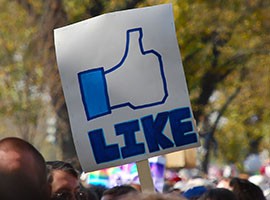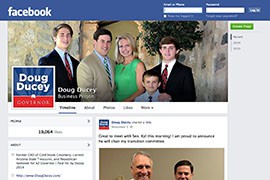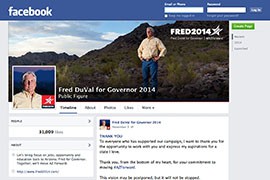- Slug: BC-CNS-Anti Social,600
- Sidebar: Social media engagement, poll results
- Photos available (thumbnails, captions below)
By CAMARON STEVENSON
Cronkite News
WASHINGTON – If Facebook friends were votes, Fred DuVal would be the next governor of Arizona.
But DuVal, a Democrat with 30,425 fans of his social media site on Election Day, was defeated easily Tuesday by Republican Doug Ducey and his comparatively small 18,866 Facebook fans on that day.
While it’s nice to be liked as a politician, it’s better to be elected. And the results of this week’s balloting in Arizona challenge conventional wisdom and recent studies that suggest candidates with a more engaging social media presence are more likely to win elections.
“I think we need a lot more research to be conducted that’s really systematic,” said Diana Owen, an associate professor of political science in Georgetown University’s Communication, Culture, and Technology graduate program.
Social media had a big impact on President Barack Obama’s 2008 election, Owen said, but studies trying to pin down any ongoing correlation between a political campaign’s social media and its election results are “sketchy at best.”
That was borne out in Arizona’s statewide and congressional races: About half of those candidates with better social media numbers ended up winning, about half ended up losing. Counting tweets, it turns out, isn’t the same as counting votes.
Facebook uses 14 different metrics to measure engagement on a candidate’s fan page, including people who like the page, comments on a post and sharing the page’s post to their own network. It converts those into a number that lets users know how many “people are talking about” a Facebook page at any given time.
Political communications firm MacWilliams Sanders Erikson looked at Facebook’s impact on the 2012 elections, analyzing candidates’ Facebook engagement over three months.
It found that candidates with more engaged Facebook pages won eight of nine Senate races and 20 of 33 House races it looked at that year, concluding that campaigns that engage online fans “will be rewarded with a meaningful voting bump on Election Day.”
But the study did have one anomaly: Arizona.
The state’s U.S. Senate race that year was the only one where Facebook engagement did not correlate with election results in the firm’s study. It looks like the same thing happened in Arizona’s 2014 midterm elections.
Facebook’s metrics said DuVal had 8,000 people “talking about” him on Facebook on Election Day, compared to 1,200 for Ducey. But Ducey ended the day with 685,200 votes to DuVal’s 531,849, according to the latest unofficial returns from the Arizona Secretary of State’s office Friday.
Races for state school superintendent, secretary of state and attorney general followed suit. Attorney General-elect Mark Brnovich didn’t even have a Facebook fan page for his campaign, but bested Felecia Rotellini who had almost 4,000 people talking about her on Election Day.
The state’s congressional races were a little more likely to align social-media success with ballot-box success, but it wasn’t perfect.
Owen said that while social media isn’t the best source for election predictions, she does believe it has some effect on voter turnout.
“It might encourage people to turn out,” she said. People who follow candidates on social media are signing up for constant updates, which can turn in to reminders to get to the polls as Election Day gets close.
A study done by the University of California, San Diego, appears to agree with her. Professors there looked at social media networks that put out Election Day messages encouraging users to vote, and found that such messages resulted in 340,000 additional votes nationwide.
But Owen said it would be risky to assume anything more than that.
“I don’t hold much faith in the ‘number of tweets equals the winner’ theory,” she said.
^__=
Web Links:
_ MSE study results: http://www.politico.com/magazine/story/2014/01/facebook-predict-who-wins-senate-2014-102401.html#.VFpVOGTF8n8
_ UCSD study: http://fowler.ucsd.edu/massive_turnout.pdf
_ Arizona Secretary of State unofficial returns: http://results.enr.clarityelections.com/AZ/53314/148511/Web01/en/summary.html
^__=
SIDEBAR:
Anti social
Being active on social media may not hurt politicians, but it may not help, either. In Arizona elections this week, higher Facebook measures of people “talking about” a candidate’s page aligned with electoral victory only about half the time. The winners, losers, and their Facebook scores:
– Governor: Fred DuVal, 8,000; winner Doug Ducey, 1,200
– Superintendent of Public Instruction: David Garcia, 2,600; winner Diane Douglas, 121
– Secretary of State: Terry Goddard, 2,200; winner Michele Reagan, 336
– Attorney General: Felecia Rotellini, 3,800; winner Mark Brnovich, 0
– 1st District: Andy Tobin, 956; winner Ann Kirkpatrick, 729
– 2nd District:* Ron Barber, 2,300; Martha McSally, 835
– 3rd District: Gabriela Saucedo Mercer, 503; winner Raul Grijalva 338
– 4th District: Winner Paul Gosar, 316; Mikel Weisser, 12
– 5th District: Winner Matt Salmon, 11,800; James Woods, 929
– 6th District: Winner David Schweikert, 186; John Williamson, 0
– 7th District: Winner Ruben Gallego, 1,100; Joe Cobb, 6
– 8th District: Winner Trent Franks, 5; Stephen Dolgos, 0
– 9th District: Winner Kyrsten Sinema, 2,900; Wendy Rogers, 1,100
* No winner declared as of Friday.
^__=
An active social media presence may help a politician – or it may not. In Arizona’s statewide and congressional races this year, it was a tossup. About half those campaigns with an active social media prsence won their races, about half lost. (Photo by Adam Fagen via flickr/Creative Commons)
Republican Doug Ducey won the Arizona governor’s race Tuesday with a Facebook presence with fewer likes and less buzz on Election Day than Democratic opponent Fred DuVal. (Photo courtesy Facebook/Doug Ducey)
Democratic gubernatorial nominee Fred DuVal had more than 30,000 Facebook “likes” and 8,000 people talking about his page on Election Day, well more than Republican opponent – and winner – Doug Ducey. (Photo coutesy Facebook/Fred DuVal)


